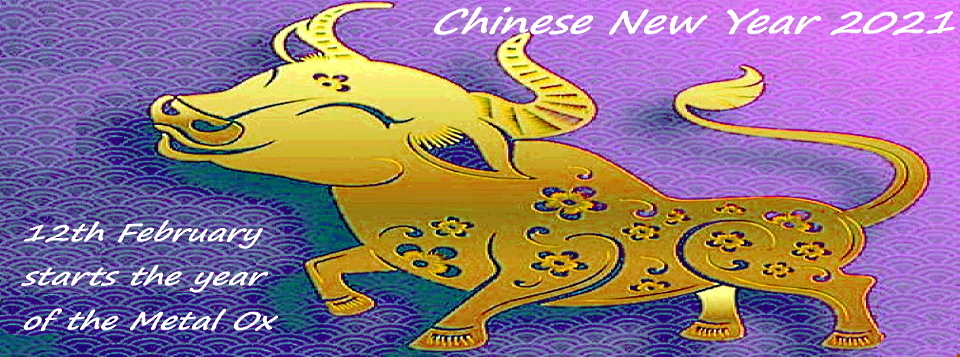Chinese New Year - Lunar New Year - Spring Festival
Written by Anne Newman 21st January 2020 - updated
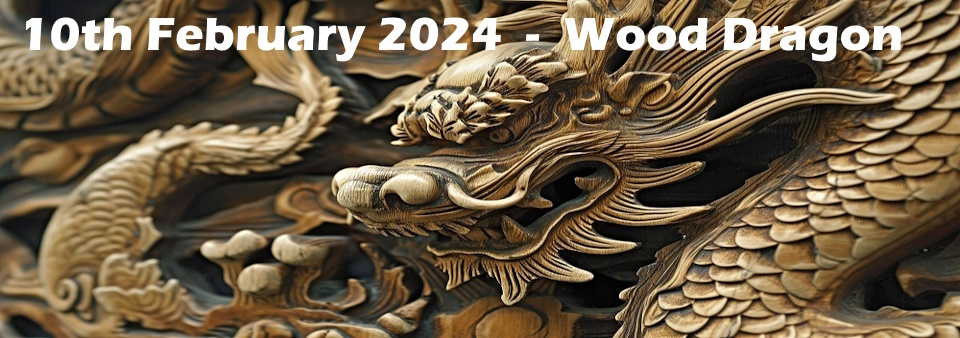
This is the festival that celebrates the beginning of a New Year on the traditional Chinese calendar. The first day of Chinese New Year usually falls on the second new moon after the Winter Solstice. This appears between 21 January and 20 February. This Year, 2024, the first day of the Chinese New Year will be on Saturday, 10 February. (The New Moon in Dublin is 9 February at 22.59 as there is, of course, a time difference between Ireland and China.)
The festival was traditionally a time to honour deities as well as ancestors. Within China, regional customs and traditions of the New Year vary widely, and the evening preceding Chinese New Year's Day is frequently regarded as an occasion for Chinese families to gather for the annual re-union dinner.
It is also traditional for every family to thoroughly clean their house, in order to sweep away any ill-fortune and to make way for incoming good luck.
Every street, building, and house where Spring Festival is celebrated is decorated with red. Red is the main colour for the festival, as red is believed to be an auspicious colour. Banks and official buildings are decorated with red New Year pictures depicting images of prosperity. Most public decoration is done a month before, but home decoration is traditionally done on Chinese New Year's Eve.
Red Chinese lanterns hang in streets to drive off bad luck.
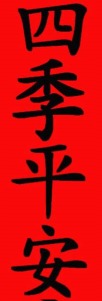 | Red couplets are pasted on doors. The good wishes are usually posted in pairs as even numbers are associated with good luck and auspiciousness in Chinese culture. Couplets are brush works of Chinese calligraphy, in black ink on red paper. These say - May you be blessed with peace and travel safely in all seasons. Fengshuiweb.co.uk. | 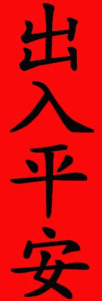 |
Red Paper cutouts.
The image of an auspicious plant or animal typically provides the theme of the New Year's paper cutting. Each animal or plant represents a different wish. For example, the peach symbolizes longevity; the pomegranate, fertility; the mandarin duck, love; the pine tree, eternal youth; the peony, honour and wealth; a magpie perched on the branch of a plum tree forecasts that a lucky event will soon happen.
Firecrackers.
It is also a tradition to set off one string of small firecrackers first, followed by three big ones, which symbolizes ringing out the old year and ringing in the New Year. The louder the three firecrackers, the better and luckier business and farming will be in the coming year.
Giving money in red paper envelopes.
They are called hongbao in Mandarin and lai see in Cantonese. The term “red packets” has also come into common use, though hongbao look and function more like envelopes than packets. Giving red envelopes is a way to send good wishes and luck. Red envelopes are given out from older to younger, from bosses to employees, and from leaders to people of lower status. It is a special New Year's bonus.
The significance of red envelopes is the red paper, not the money inside. Wrapping lucky money in red envelopes is expected to bestow more happiness and blessings on the receivers. It is impolite to open a red envelope in front of the person who gives it to you. It's a tradition to put crisp, new bills inside a Chinese New Year red envelope. Giving dirty or wrinkled bills is in bad taste. Avoid putting coins in the envelopes. Avoid giving amounts such as 4, or 40.. The number '4' in Chinese sounds like 'death', so this is considered bad luck. Even numbers, except four, are better than odd. It is best if the amount starts or ends in eight, as it is considered to enhance luck. Always receive your red envelope with both hands. It is impolite to accept a red envelope with just one hand.
Superstitions.
Washing hair or clothes is not allowed on the first day of the lunar year because it is seen as “washing one’s fortune away” at the beginning of the year. Sweeping up and taking out the garbage symbolises removing the good luck from the house.
Porridge should not be eaten, because it is considered that only poor people have porridge for breakfast, and people don't want to start the year "poor" as this is a bad omen.
People do not wash clothes on the first and second day, because these two days are celebrated as the birthday of Shuishen (水神, the Water God).
Hair must not be washed on the first day of the lunar year. In Chinese language, hair (发) has the same pronunciation (and indeed is the same character) as fain facai (发财), which means 'to become wealthy’. Therefore, it is seen as not a good thing to “wash one’s fortune away” at the beginning of the New Year.
The use of knives and scissors is to be avoided for any accident, whether harming a person or tool, is thought to lead to inauspicious things and the depletion of wealth in the coming year.
A married daughter is not allowed to visit the house of her parents, as this is believed to bring bad luck to the parents, causing economic hardship for the family. Traditionally a married daughter visits the house of her parents on the second day of Chinese New Year.
The cry of a child is believed to bring bad luck to the family, so parents do their best to keep children from crying by whatever means possible.
Breaking tools or other equipment during this period is associated with a loss of wealth for the coming year; therefore tradesmen and business people in general take great precautions to prevent it.
A visit to the hospital during this period is believed to bring illness to the person in question for the duration of coming year; therefore visits to the hospital are avoided, except in cases of extreme emergency.
It’s a taboo for a person to brew herbal medicine or take medicine on the first day of the lunar year, otherwise it is believed he or she will get ill for a whole year.
In some places, after the bell announcing the New Year at midnight New Year's Day, sickly people break their gallipots (medicine pots) in the belief that this custom will drive the illness away in the coming year.
Money should not be lent on New Year’s Day, and all debts have to be paid by New Year’s Eve, and, if someone owes you money, do not go to his or her home to demand it. Anyone who does so it is said will be unlucky all the year.
Do not wear clothes that are damaged. If kids especially wear such clothes in the first lunar month, it is said to bring bad luck.
Do not wear white or black clothes as these two colours are associated with mourning.
Don't give certain gifts, like clocks and scissors, as they have a bad meaning in Chinese culture.
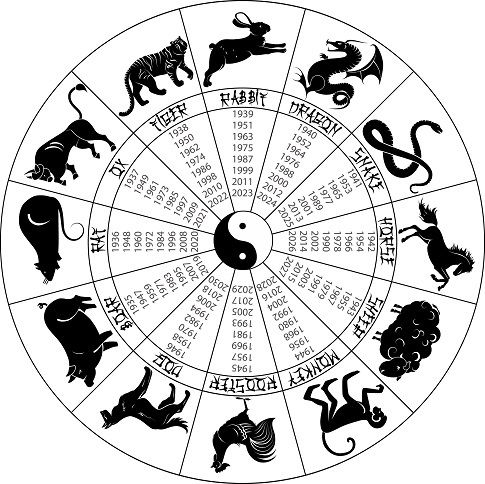
Animal zodiac year.
There are 12 Chinese zodiac animals. In order, the 12 animals are Rat, Ox, Tiger, Rabbit, Dragon, Snake, Horse, Goat, Monkey, Rooster, Dog and Pig.
25th January 2020 was Chinese New Year / Lunar New Year / Spring Festival. 2020 was the Year of the Metal Rat.
Unlike the western zodiac, the Chinese zodiac isn’t based on the stars. Instead, the animals have arisen as a result of a Chinese fairy tale thought to have it's roots in Taoism, an ancient Chinese religion. The exact story varies from place to place and according to story tellers, but at the core, it involves the 12 zodiac animals and a race.
One version of the legend says that the Jade Emperor, the ruler of Heaven and the Earth, decided to hold a race to pick the animals for the Chinese zodiac to celebrate his birthday.
All the animals in the world were invited to participate in the race and the first twelve to cross the heavenly river would be picked to be zodiac animals. The rat and the cat were supposedly friends, and the story goes, the rat was supposed to wake the cat bright and early so they could start the race together. On the day of the race however, the rat either forgot to, or deliberately didn’t, wake the cat, which is why the cat doesn’t feature on the Chinese zodiac. It is also supposedly the reason why cats have been pursuing rats ever since.
For most of the animals, the race itself wasn’t an issue – but the crossing of the heavenly river proved to be a great difficulty. The rat, for one, couldn’t make it across on his own and so asked the ox for help – and the ox gladly offered it, by allowing the rat to ride on it's back. But as they approached the finishing line, the rat was said to have cheated by jumping off the ox and onto the other side, thereby becoming the first animal on the Chinese zodiac. The other animals crossed the line in order of ox, tiger, rabbit, dragon, snake, horse, sheep, monkey, rooster, dog and pig, and became the next eleven animals zodiac, each taking one year in the twelve-year calendar.
In some legends, each animal is supposed to have used their special trait to help them cross the river, which is represented in the personality of an individual.
In Chinese element theory, each zodiac sign is associated with one of the five elements: Wood, Fire, Earth, Gold (Metal), and Water. For example, a Wood Rat comes once in a 60-year cycle.
Wood Rat (1924, 1984) - Independent,self-confident, virtuous and talented, with a strong sense of teamwork
Fire Rat (1936, 1996) - Energetic, brave, quiet, cordial and friendly to their friends, but very strict with themselves
Earth Rat (1948, 2008) - Amiable, honest, flexible, modest, serious, with a strong sense of self-esteem
Gold Rat (1960, 2020) - Smart, talented,hot-tempered, jealous, with a strong sense of self-awareness
Water Rat (1912, 1972) - Talkative, shrewd, conservative, and wise
The Year of the Metal Rat 2020
A year of new beginnings! New opportunities for finding true love and earning more money. 2020 is going to be successful! The Metal Rat Year is going to be a strong, prosperous, and lucky year for almost all chinese zodiac signs. Everyone will show determination regarding their goals, aspirations, and even their hobbies. This is a great year for founding and evolving. Those who plan to buy a house, to start a business or to invest money in a long-term project have great chances of being satisfied in the future. But, beware! This type of initiative will only be successful if they are carefully planned.
